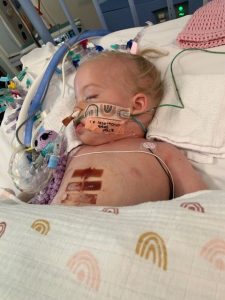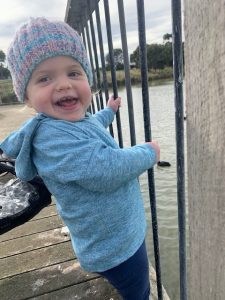Not many families receive the gift of organ donation twice. For two year old Riley and her parents Katrine and Rob, the prospect of needing two separate liver transplants quickly became their reality.
Riley was just 32 days old when she was diagnosed with Cystic Biliary Atresia, a very rare paediatric liver condition that occurs when a baby’s bile ducts do not develop normally. This in turn reduces the liver’s ability to properly drain bile.
Riley was taken to The Royal Children’s Hospital (RCH) to undergo the Kasai procedure – a surgery which attaches a piece of the small intestine to the liver to allow bile to flow, while simultaneously removing as many damaged bile ducts as possible. While the procedure was initially successful, a string of complications post-surgery indicated that Riley’s liver was riddled with infection and a liver transplant became her only option.

The day Katrine and Rob found out that a liver had become available for Riley was a mix of shock and anxiety, but also one of gratitude.
“We knew this was coming but of course, it still was a big shock when it happened. It was also a moment of thanks, as we were very aware that this was only possible because a donor family had lost their loved one and were giving Riley the ultimate gift of life. We were incredibly grateful, and still are, that this family were able to make such a hard decision when they were no doubt in a tremendous amount of grief,” said Katrine.
“The first transplant was a very hard day. We were told her native liver was very sick and was very difficult to remove due to the condition it was in. Riley was in a very bad way, which really became apparent over the next couple of days. She was at a great risk of uncontrollable bleeding, had swelling on the brain, and was attached to a filter to help her kidneys work. Although she was fighting hard and her new liver was trying to work, it just wasn’t doing what it needed.”
Riley was quickly placed back onto the Category 1 waiting list, while Katrine and Rob began the hour-by-hour wait to find out if a new donor would become available in time.
“We were waiting by her bedside and willing her to hold on. It was by far the worst few days of our lives. Luckily at the 11th hour, another donor was found. Again, we knew that this came at a tremendous cost to another grieving family and we were just so incredibly grateful once again. We met with the surgical team after the operation and from the look on their faces, we could tell things had gone a lot better. The relief we felt is difficult to put into words, but we finally felt hope that Riley would come out of this okay,” said Katrine.
While Riley is currently undergoing therapy to help her development and recovery, Katrine says she is going from strength to strength.
“Seeing her learn to crawl, walk, talk and dance has been the most amazing journey. She is such an energetic, courageous little girl that has no fear and such a love for life. She has just turned two… and boy has she turned two! Playing with her big brother is probably her most favourite thing to do, along with dressing up in her favourite dresses and dancing to The Wiggles.”

This week marks the tenth annual DonateLife week, a national campaign that aims to raise awareness about the importance of organ and tissue donation in Australia. Having firsthand experience of its lifechanging impact, Katrine and Rob urge families to have the conversation about organ donation.
“Organ donors have saved Riley’s life twice now. They have also saved our family. It truly was the gift of life and we will forever be grateful to these donors and families for being able to make these decisions, they are true heroes in our eyes,” Katrine said.
“I think it is important for people to understand that this doesn’t just happen to ‘other people’. We never thought this would be our journey and now I hope we can give back in some way. Becoming an organ donor and discussing your decision with your family and friends is truly a special way to save lives. Letting your loved ones know this is your wish is also such an important step, we should all take the time to talk about organ donation with those around us.”
For more information about the campaign and to learn how you can make a difference, visit the DonateLife website.